Nutrition For Your Kiddo
You want the absolute best possible nutrition for your little one. I know the feeling. I’m a certified nutritionist and self-proclaimed foodie and I STILL have no idea where to find good resources, especially when it comes to mammalian milk and its alternatives. My SugarPieHoneyBun is bought-in to the “whole foods” thing, but happens to be a frugalist. So when I’m the one grocery shopping, I pretty much spend top dollar for all consumables and just update Lizzie after she checks the credit card bill and “graciously” confronts me. Winning at marriage is all I gotta say.
White Gold | Our Story
Our son Canaan is one year old, (and since Liz’s hefty freezer stash is running out) we’re weaning him off of breastmilk (gift, not a given), and weaning him onto some other colloidal cocktail. Predominantly because our pediatrician said to do so… as did all of our non-progressive, non-vegan friends… as did every Facebook based mom-forum and mainstream mom-blog. But what are the current guidelines? And who informs those guidelines? Here’s one crucial assumption before we move on:
“Human milk is uniquely superior for infant feeding and is the reference against which other infant feeding strategies must be measured.” – from the American Academy of Pediatrics (AAP).
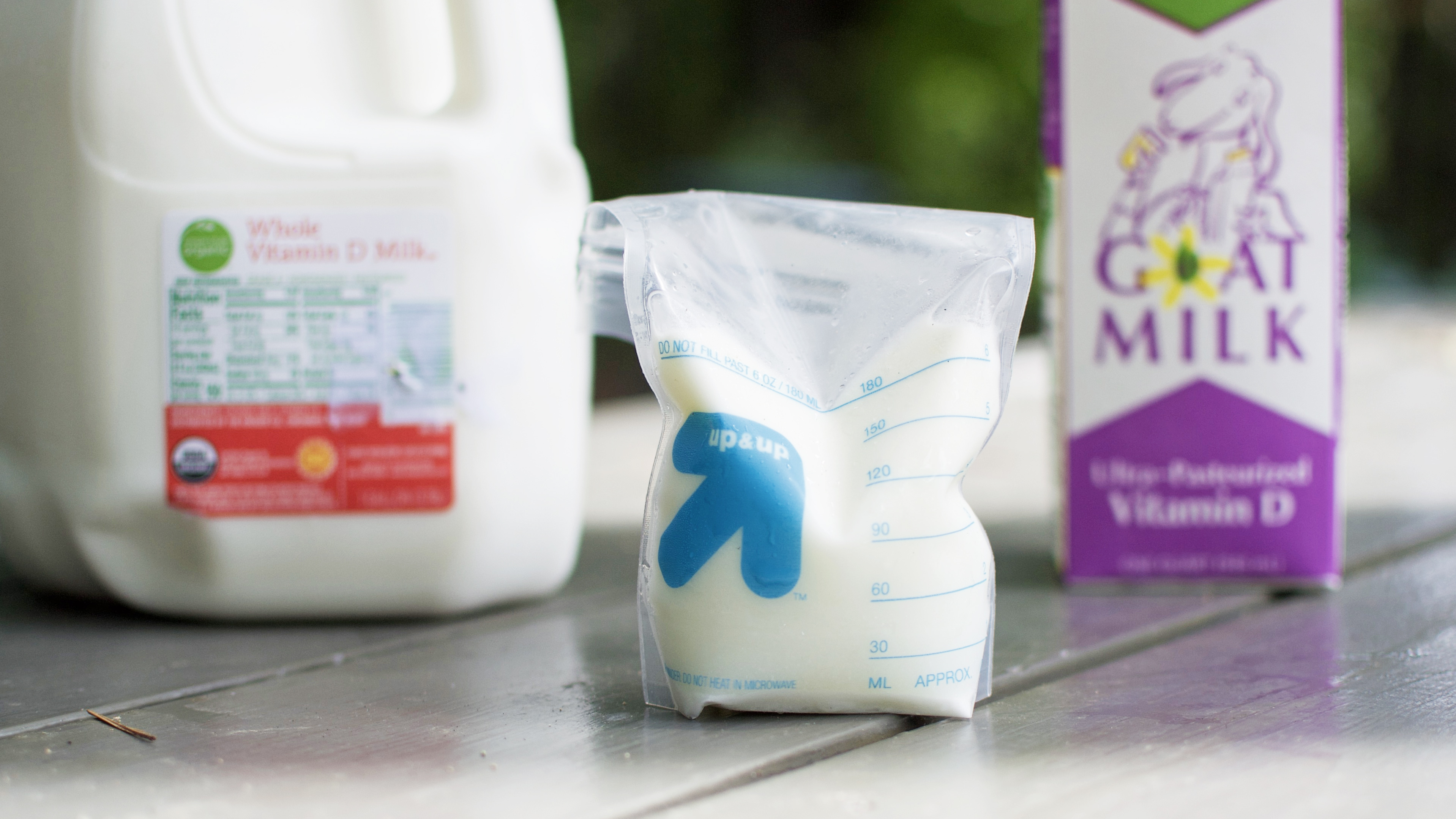
Disclaimer
Socioemotional disclaimer: you are a “good parent” if you feed your child to the best of your ability. Breastmilk or formula, both grow healthy and thriving babies and children. From our experience, breastfeeding is exceptionally difficult. Bras-off to the mothers who give it their best clot (cue Liz’s dramatic eye roll at my dad jokes). And bottles-up to moms and dads who spend substantial amounts of their hard-earned cash on any nutritionally-rich formula, and meticulously feed their kiddos day in and day out.
And back to you, MO! (For my Nickelodeon GUTS™ fans out there).
The Standard Guidelines
AAP quote paraphrase: human milk is perfectly crafted for human babies with respect to caloric density, macronutrients (protein, fat, carbs) and micronutrients (vitamins & minerals). NIH’s MedlinePlus states that cow’s milk should be off limits until 12 months of age due to nutrient deficiencies. WebMD, referring to AAP guidelines, states that cow, goat AND soy milk are inappropriate for babies younger than 12 months for the same reasons.
But what should the tiny human drink at 12 months?? The World Health Organization recommends breastfeeding until 24 months, supplementing nutrient-dense complimentary foods at 6 months, and increasing food intake to 2/3 of the diet from 12-24 months. AAP’s Bright Futures: Nutrition states that if cow’s milk is introduced at 12 months, it should be whole milk.
The Suckle is Real
What if dairy milks give Bamm-Bamm the boom booms (intolerance)? Do you choose nut-based milk alternatives? What if nut-munching stimulates Dexter’s epithelial immunological inflammation (allergy)? Switch to Rice? Coconut?? Oat???
You get the picture. Way more “don’ts” than “dos” paired with “unknowns” and “fake news.” But the truer the news, the fewer the ruse, and the knewer the knows, how much less you suppose (hashtag Seuss interpose). And after digging through 5 various organizations that set the feeding standards, 10 medical websites, 15 research journals and the momsoon of highly credible motherbloggers… I. Gave. Up.
My Milk Research
Shortly thereafter, I allowed my philanthropic heart to ketchup to my calloused mind, I mustard up some relish and created this chart (these dad puns are slowly becoming second nature):
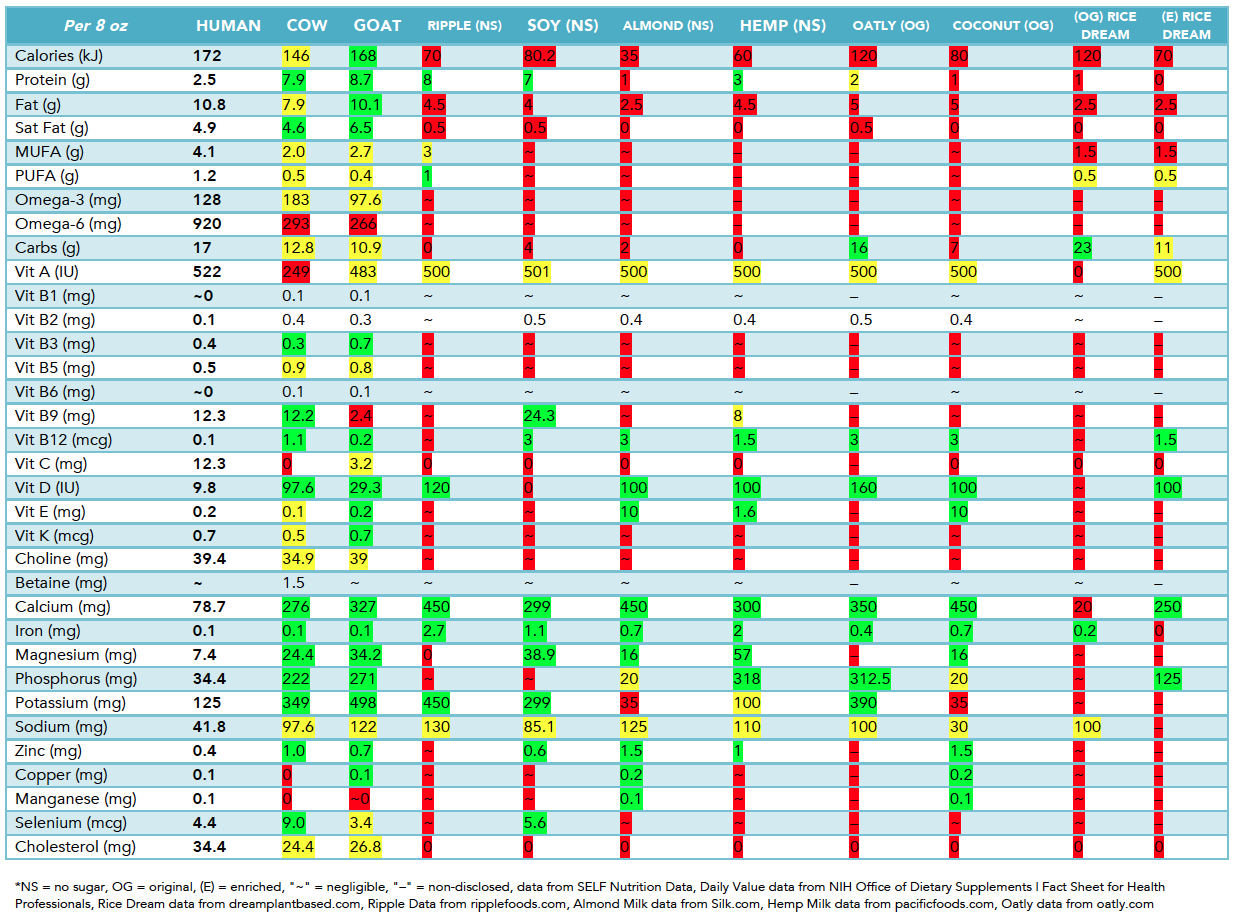
Human milk compared to 2 other animal milks, pea, legume, seed, grain and palm milks. The y-axis contains the nutritive categories, and the x-axis on top offers the type of milk. Notice Ripple brand (pea), Oatly brand (oat) and Rice Dream brand (rice) as the best available options in their arenas. With human white-gold as the standard, I color-coded the rest with greens, yellows and reds.
Green – the nutritional component is greater or equal to human milk.
Yellow – the nutritional component is somewhat lesser than human milk.
Red – the nutritional component is clearly insufficient compared to human milk.
The Research, Interpreted
Conclusion? Let’s scope the data:
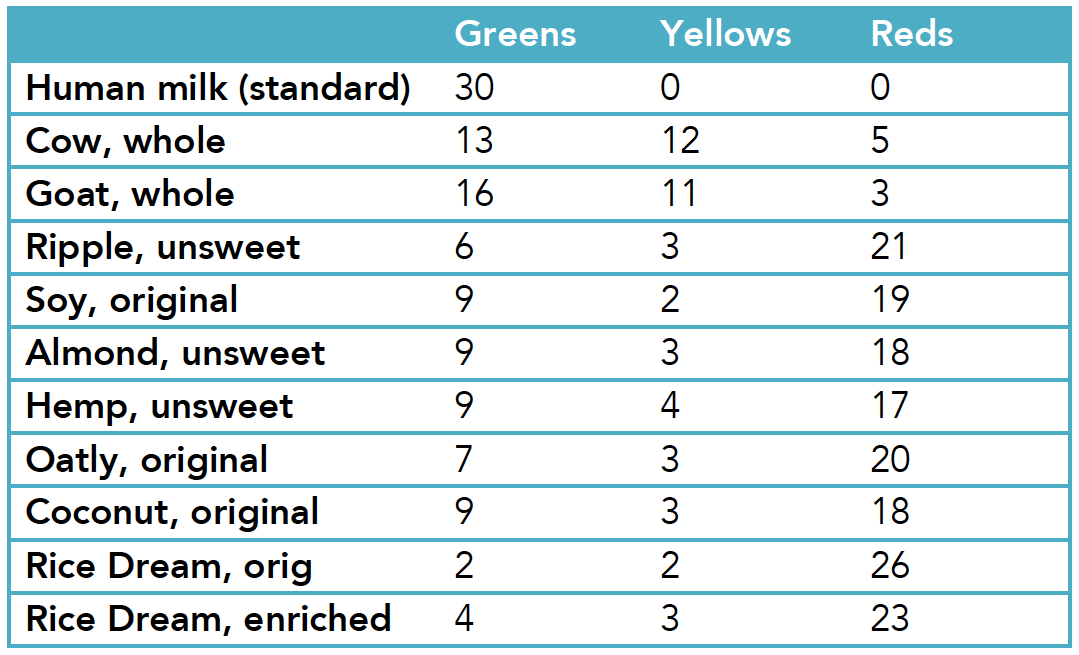 From a nutritive perspective ONLY, goat’s milk is the closest option to human milk. Second place goes to cow’s milk. The others are simply NOT designed to replicate human milk, although they clearly have nutritional benefits above water, soda, sweet tea, lemonade, La Croix (like your hipster chillens are sipping this bad & bourgeoisie beverage), etc. If you’re on the “fat is essential for brain development of toddlers” train, then whole goat’s is likely sufficient and whole cow’s is a little lower than ideal. If calories if your goal, goat is a little better than cow with all others far behind. Here’s a close-up:
From a nutritive perspective ONLY, goat’s milk is the closest option to human milk. Second place goes to cow’s milk. The others are simply NOT designed to replicate human milk, although they clearly have nutritional benefits above water, soda, sweet tea, lemonade, La Croix (like your hipster chillens are sipping this bad & bourgeoisie beverage), etc. If you’re on the “fat is essential for brain development of toddlers” train, then whole goat’s is likely sufficient and whole cow’s is a little lower than ideal. If calories if your goal, goat is a little better than cow with all others far behind. Here’s a close-up:
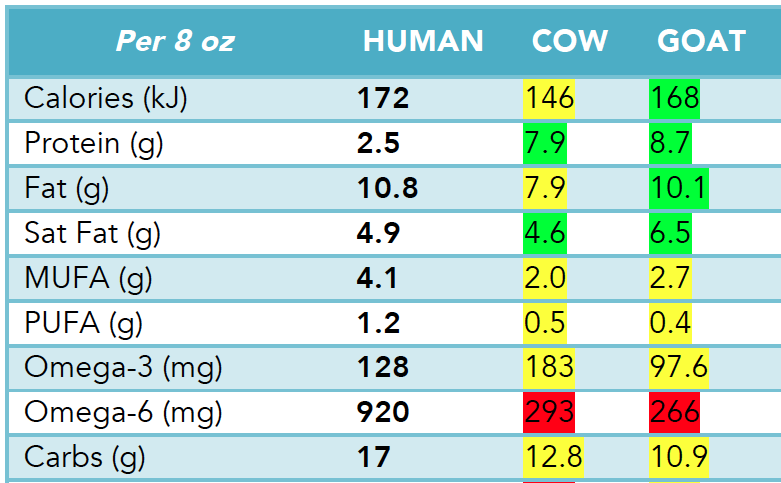
The Other Factors to Consider
Note: there isn’t a conclusion quite yet. Consider this evidence. As I continue to investigate the comparisons, I’ll be sure to post my new discoveries. Thanks for joining in on this nutritional adventure! In the meantime, here are a few other factors to consider:
- What is the solute concentration of each milk product? In other words, are the components of the milk oversaturating, undersaturating, or perfectly saturating the liquid for ideal absorption and usage in toddler bod?
- What’s the bioavailability of the nutrients in each product? This translates to usability of the nutrients. What percentage of each nutrient is used to benefit the body, and what percentage is wasted? Is it true that added vitamins and minerals are far less bioavailable than naturally occurring ones?
- If a 12 month old eats a perfectly balanced diet (yeah right), are the nutrients in these milks still necessary or just a bonus?
- What about allergies or sensitivities to the milk protein casein? How does casein differ in human vs. cow vs. goat?
- Does soy actually contain phytoestrogens aka plant-estrogens that may mimic the effects of estrogen in a very small way?
More to come, friends! Be sure to comment below with anything else you want us to investigate further for the follow-up post. To be continued…
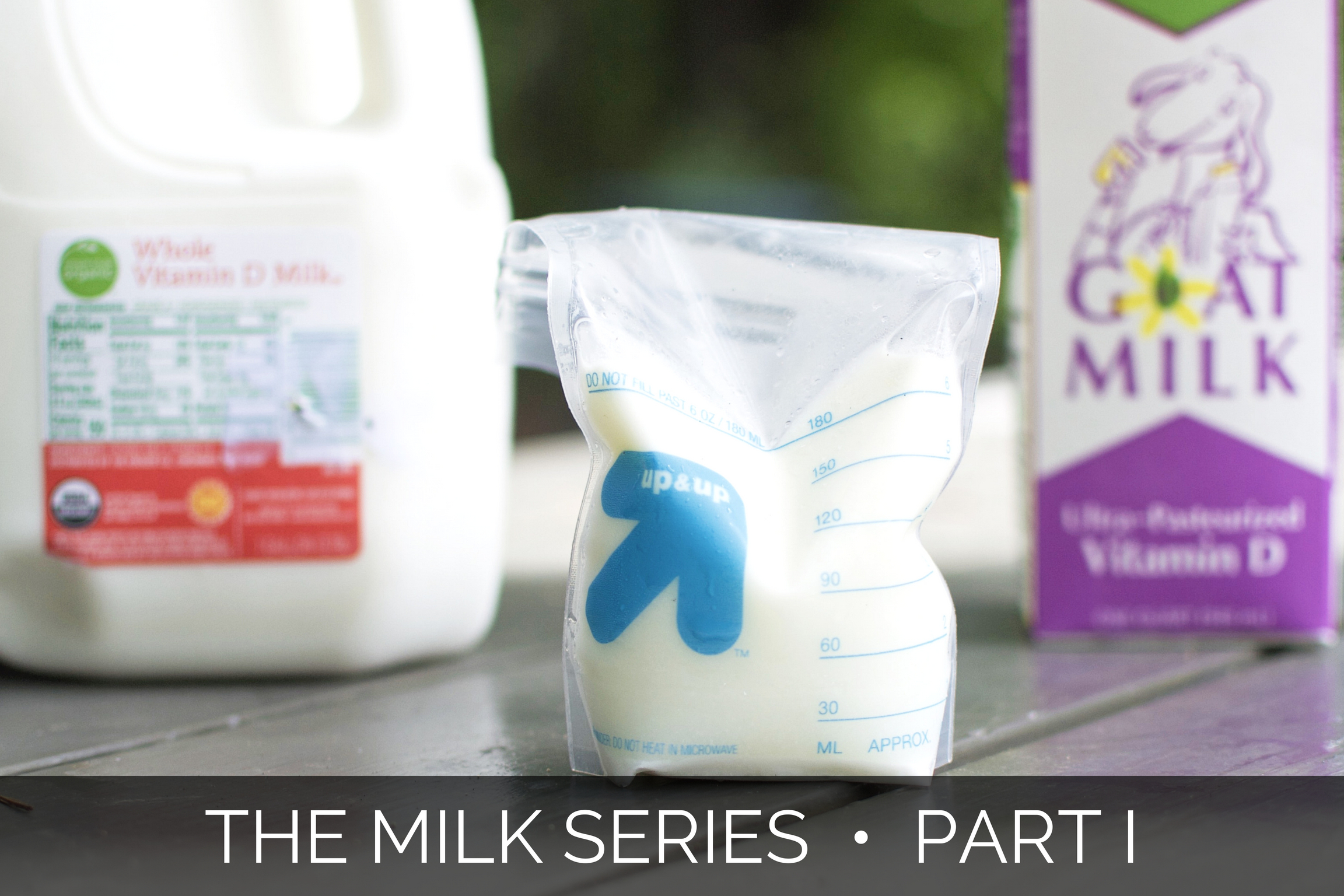



Usually, I don’t comment on posts but this is really great. Thanks so much for writing this. Keep it up. (My wife sent me the link and said, “you gotta read this!”) 😉
So glad to help, Zeus! Appreciate the shout out.
Thank you so much for this! My son is allergic to almost everything under the sun and as far as dairy he is allergic to it all. He is even allergic to milk alternatives. So I really appreciate you doing the leg work as I have had mastitis 3 times but I h e been scared to ween him. Ripple and all other alternatives have been unsuccessful for me so I am super grateful.
You’re so welcome, Mica! It’s so hard to feel like you’ve exhausted all options and have nowhere to turn. I can’t even imagine mastitis one time. I’ve actually seen a small handful of studies that connected certain probiotics and mastitis treatment / prevention. Something to look into! I’d recommend doing google scholar searches to uncover some gems. Healthline.com is my other favorite for evidence-based alternative therapies / ideas. WebMD + Mayo don’t get in the weed enough for my taste. And bloggers are to be taken with a grain of salt – credentials definitely help.
Please let me know how it goes. We did baby led weaning with our little one, starting at 6 months. It led me to dig into the perceived necessity of milk during/after weaning. Based on my nugget’s voracious appetite, and adventurous palate, it seemed that his variety of whole foods didn’t necessitate milk of any kind.
Obviously do whatever your pediatrician says. But something to think about!